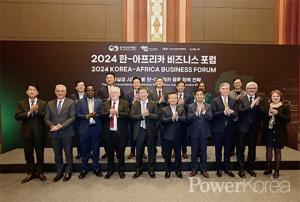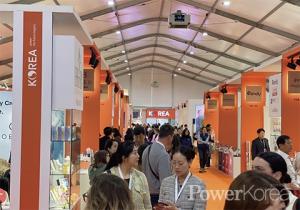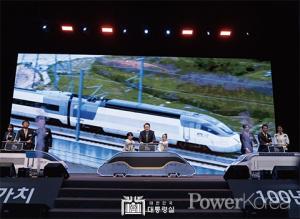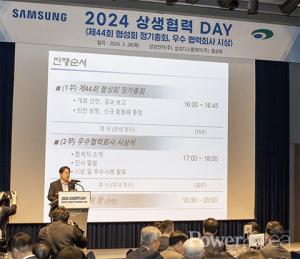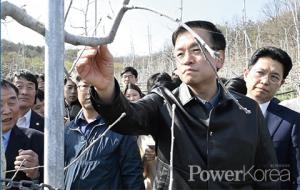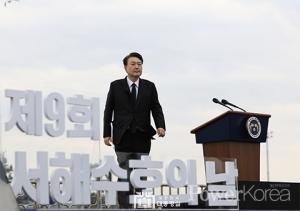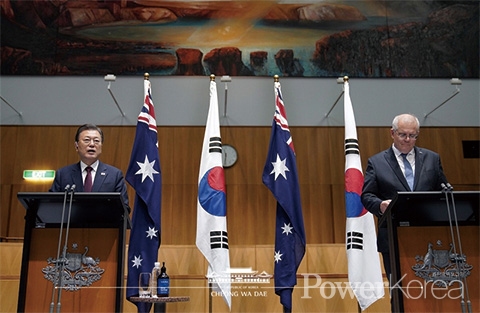 |
||
On 13 December 2021, the Hon Scott Morrison, Prime Minister of Australia, welcomed His Excellency Jaein Moon, President of the Republic of Korea, on a state visit to Australia.
Ⅰ. COMPREHENSIVE STRATEGIC PARTNERSHIP
Recalling both countries having stood shoulder-to-shoulder in the Korean War, the two leaders reflected on the shared history between Australia and the Republic of Korea (ROK) on the occasion of this year’s 60th anniversary of diplomatic relations. They recognized that the strong strategic, economic and people-to-people ties that have developed between Australia and the ROK are not only of mutual benefit, but contribute to our common vision of an open, inclusive, and prosperous Indo-Pacific region. Demonstrating their ambition to further deepen and fulfil the potential of this vibrant, modern relationship, the two leaders announced its elevation of diplomatic relations to a Comprehensive Strategic Partnership (CSP). The CSP builds on already strong cooperation and trusted dialogue between the two governments across many mutual interests, flourishing economic ties, and affinity between our peoples. It is enlivened by our shared values of democracy and universal human rights, and our commitment to a regional and global order where international law, rules and norms guide cooperation on common challenges, drive economic prosperity, promote the peaceful resolution of disputes, and ensure the sovereignty and territorial integrity of states. It is these common principles that underpin Australia’s approach to the Indo-Pacific and the ROK’s New Southern Policy Plus. A program of enhanced bilateral cooperation under three pillars – strategic and security; economic, innovation and technology; and people-to-people exchange – will underpin the CSP.
Ⅱ. STRATEGIC AND SECURITY COOPERATION
The security of Australia and the ROK is tied to the stability, openness, and prosperity of the Indo-Pacific and a rules-based international order that protects the rights and sovereignty of states regardless of size or power. Our coordination toward these objectives has deepened since the establishment of the biennial 2+2 Foreign and Defense Ministers’ Meeting in 2013. Prime Minister Morrison and President Moon agreed to extend bilateral cooperation across security and defense, cyber and critical technologies, health, border protection, and development cooperation in the Indo-Pacific region. Australia and the ROK have expanded our defense cooperation since 1953 to include joint bilateral and multilateral military exercises, and bilateral military education and training, and have worked together for the peace and stability of the Korean Peninsula. In recognition of this, leaders acknowledged that this Joint Statement reflects deepening defense and security cooperation between our armed forces, building upon the 2014 Vision Statement. Leaders agreed to promote closer cooperation between our defense industries, particularly on strengthening regional defense materiel supply chains. To support greater engagement in this area, Australia and the ROK have signed a Memorandum of Understanding on Defense Industry and Defence Materiel Cooperation. This will allow the ROK’s Defense Acquisition Program Administration to work more closely with Australia’s Defense Capability, Acquisition and Sustainment Group to share information on procurement practices. Leaders also agreed to strengthen collaboration in the field of defense science and technology, including cooperation with other allies and partners. They noted that procuring and operating an increasing number of similar platforms will support improved coordination during joint and combined exercises, both bilaterally and multilaterally. Australia and the ROK recognize pandemic response as a global health and economic challenge for the Indo-Pacific. Leaders welcomed the contributions the two countries have made through coordination on the transparent and equitable supply of COVID-19 vaccines to our region. They committed to pursue further coordination on COVID-19 responses, including by enhancing cooperation on vaccine access and delivery, while working together and with partners to build regional countries’ preparedness for future pandemics. Leaders welcomed the first Australia-ROK Tech-Bridge in September 2021, which supported collaborative research projects on applications of artificial intelligence to counter infectious disease, and noted the two governments’ support for closer cooperation between Australian and Korean industries on vaccine research and development, including through an inaugural roundtable and health officials’ workshop. Australia and the ROK are natural partners for Southeast Asia and ASEAN and recognize the region’s stability and prosperity as indispensable to an open, inclusive and prosperous Indo-Pacific. The two leaders reaffirmed their support for ASEAN centrality, and the East Asia Summit as the region’s premier forum for leaders’ strategic discussions. They expressed their commitment to the principles outlined in the ASEAN Outlook on the Indo-Pacific (AOIP) and to expanding existing cooperation to support practical implementation of the AOIP. This will include coordination between relevant infrastructure programs led by Australia’s Department of Foreign Affairs and Trade and the Korean Overseas Infrastructure and Urban Development Corporation (KIND). The ROK and Australia will also co-host a forum focused on enhancing maritime connectivity in Southeast Asia, in support of ASEAN’s connectivity agenda. Leaders further announced they would explore a package of cyber and critical technology initiatives to support Southeast Asia’s digital revolution, and welcomed the signature of a Memorandum of Understanding on a Digital Cooperation Initiative in Southeast Asia. Leaders underscored their shared vision of an open, secure, stable, accessible and peaceful cyberspace that drives economic prosperity, protects national security and promotes international stability. They welcomed the signing of the Memorandum of Understanding on Cyber and Critical Technology Cooperation by Foreign Ministers on 13 September 2021, as well as the inaugural Cyber and Critical Technology Policy Dialogue on 9 December 2021. As major maritime trading nations, Australia and the ROK recognise that the stability of the Indo-Pacific depends on adherence to international law in the maritime domain, including in the South China Sea. Leaders underscored that disputes must be resolved peacefully and in accordance with international law, including the United Nations Convention on the Law of the Sea. They reaffirmed the importance of upholding freedom of navigation and overflight. They agreed to strengthen coordination to uphold these principles, which must not be undermined in the context of increasing risks of instability in the maritime domain. Australia and the ROK will also work together to protect our maritime domains. To support these efforts, leaders agreed that Australia’s Department of Home Affairs and the Korea Coast Guard will enhance information sharing and practical cooperation on civil maritime security between our countries to promote a secure regional maritime domain. Reaffirming their commitment to deepen partnerships with Pacific Island countries and support the region’s economic recovery and resilience, the leaders noted the need for stable, inclusive Pacific architecture to facilitate regional collaboration. The leaders reaffirmed their commitment to work with Pacific Island countries in areas such as health, infrastructure, disaster response and maritime capacity-building. The two leaders reaffirmed their unwavering commitment to nuclear non-proliferation and disarmament, and agreed that Australia and the ROK would continue to coordinate closely through bilateral and multilateral cooperation on these areas. They underscored their mutual commitment to the complete denuclearisation and establishment of permanent peace on the Korean Peninsula, based on previous agreements including the 2018 Panmunjom Declaration, Pyongyang Joint Declaration, and Singapore Joint Statement. Leaders called for the full implementation of relevant UN Security Council resolutions by the international community, including the Democratic People’s Republic of Korea (DPRK). President Moon appreciated Prime Minister Morrison’s strong support for the ROK’s efforts for substantive progress toward permanent peace on the Korean Peninsula. Leaders also affirmed that diplomacy and dialogue are essential to achieve the complete denuclearisation and establishment of permanent peace on the Korean Peninsula.
Ⅲ. ECONOMIC, INNOVATION AND TECHNOLOGY COOPERATION
Trade and investment between Australia and the ROK have grown significantly since the Korea-Australia Free Trade Agreement (KAFTA) entered into force in 2014. Prime Minister Morrison and President Moon expressed their strong commitment to enhancing our existing strong economic ties. Agriculture, fisheries and forestry are key pillars of economic activity in rural and regional communities in the ROK and Australia. Recognising the importance of agriculture to both countries and building on the first meeting of the ROK-Australia Committee on Agricultural Cooperation in 2021, Prime Minister Morrison and President Moon agreed the ROK and Australia would deepen ties on agriculture. The two governments agreed to collaborate in sustainable agriculture, biosecurity, food safety, agricultural innovation, resilient supply chains and mutual food security to deliver ongoing benefits to each country’s agricultural sector. Prime Minister Morrison and President Moon reaffirmed their support for the Low and Zero Emissions Technology Partnership, announced on 31 October 2021, which will accelerate the development and commercialisation of technologies to reduce emissions and create new economic opportunities. Australia and the ROK will collaborate and provide funding to the Partnership to support tangible initiatives. Early priorities include supply of clean hydrogen (including hydrogen-based compounds), low emissions iron ore and steel, and carbon capture, use and storage. Australia and ROK will also work together to advance clean hydrogen cooperation with a focus on trade, supply chain development, support for infrastructure, expanding use in the transport and power sector, institutional agreements, and enabling regulatory and skills reforms. Leaders affirmed their shared commitment to ambitious action to achieve the goals of the Paris Agreement, and to technology-led approaches that will reduce greenhouse gas emissions while also growing our economies and creating jobs. They welcomed the signature by the Minister for Trade, Industry and Energy of the ROK and the Minister for Industry, Energy and Emissions Reduction of Australia of a Memorandum of Understanding Regarding the Implementation Plan for Low and Zero Emissions Technologies and Collaboration to Advance a Clean Hydrogen Economy. The ROK and Australia will increase cooperative efforts to ensure supply chain resilience for critical minerals and associated products. Leaders recognised that cooperation across these supply chains would provide increased certainty of supply to the renewable energy and advanced manufacturing sectors. They welcomed the signature by the Minister for Trade, Industry and Energy of the ROK and the Minister for Resources and Water of Australia of a Memorandum of Understanding on Critical Mineral Supply Chains and agreed that the ROK-Australia Critical Minerals Working Group would lead collaboration across several joint initiatives, including supply chain mapping, research and development, and trade and investment opportunities. Leaders also committed to driving greater links between the two countries’ private sectors, focused on connecting stakeholders at key points of the supply chain to bolster two-way trade and investment. President Moon and Prime Minister Morrison agreed to enhance Australia-ROK cooperation on digital trade. Leaders acknowledged the robust contributions by both countries to discussions on digital trade issues in multilateral forums and agreed to expand bilateral links on this topic. They agreed to continue working with like-minded partners to establish a regional digital trade initiative. An Australia-ROK Dialogue on Digital Trade, to be held in early 2022, will discuss global trade rules that reduce barriers to digital trade and explore opportunities for practical collaboration on digital trade issues. Australia and the ROK are close partners on earth observation and imagery captured from space. To complement the establishment of an annual Australia-ROK Space Policy Dialogue, Australia and the ROK have signed a Memorandum of Understanding on Space Cooperation for Peaceful Purposes to promote joint studies, research and activities between institutes and industries acting in the space sector. At the inaugural dialogue in 2022, Australian and Korean officials will explore bilateral space cooperation and support international efforts to develop norms of behaviour in space to contribute to shaping a safe, secure and sustainable space domain. The two governments will explore enhancing links between space science communities in Australia and the ROK through the 2022 Australia-ROK Tech-Bridge, which will focus on space cooperation. Leaders acknowledged the importance of multilateral rules and institutions in promoting free and open international trade. They expressed their commitment to open, inclusive, sustainable and transparent market economy principles and the rules-based international trading system that should not be compromised by the misuse of economic policies and measures in ways that cause economic harm. They further undertook to promote closer alignment in approaches to multilateral institutions and forums including the WTO, APEC, G20 and the OECD. Both Australia and the ROK have demonstrated our commitment to rules-based regional economic integration through the Regional Comprehensive Economic Partnership Agreement. Australia welcomes the ROK’s interest in accession to the Comprehensive and Progressive Agreement for Trans-Pacific Partnership.
Ⅳ. ENHANCING PEOPLE-TO-PEOPLE LINKS
Prime Minister Morrison and President Moon noted that the affinity, mutual respect and connections between the peoples of Australia and the Republic of Korea have promoted mutual understanding of each country’s history, cultural heritage and modern outlook, and underpin the Comprehensive Strategic Partnership. Prime Minister Morrison noted that the community of Australians of Korean descent is a proud element of Australia’s multicultural society. The two leaders agreed that greater cooperation across arts exchange, research collaboration, education, tourism and entertainment, would further deepen people-to-people links and strengthen the CSP for generations to come, and welcomed the conclusion of a Memorandum of Understanding on Socio-Cultural Cooperation to guide common efforts to this end. Leaders acknowledged the Korea Foundation’s (KF) and the Australia-Korea Foundation’s (AKF) critical role in promoting bilateral partnerships and other collaborations in business, education, academia, arts, culture, and society. Leaders welcome the foundations’ agenda of collaborative work supporting the implementation of the Memorandum of Understanding on Socio-Cultural Cooperation, including through bilateral endeavours in arts and culture, education and research, next generation technology, health, sport and gender equality. Noting shared democratic values, Prime Minister Morrison and President Moon agreed to deepen cooperation on human rights, in particular gender equality. Leaders agreed the strength of our democracies is underpinned by women’s full, equal and meaningful participation and leadership. Australia and the ROK recommitted to the Women, Peace and Security agenda established by UN Security Council Resolution 1325. Leaders agreed to work together to end violence against women and girls, including cyber-exploitation, through bilateral and multilateral mechanisms. They welcomed the recent joint position statement against image-based abuse and agreed Australia and the ROK should pursue cooperation in this area while joining voices in condemning the violence and harassment of all people online, including women and girls.
V. IMPLEMENTATION
Australia and the ROK committed to hold annual leaders’ meetings to provide oversight of the CSP and to further deepen economic and strategic cooperation. Foreign and Defence Ministers will continue to meet biennially in a 2+2 format to progress initiatives under the strategic and security pillar of the CSP. Foreign Ministers will meet bilaterally in the years between 2+2s to pursue broader CSP initiatives. Relevant ministries will drive implementation of the economic pillar of the CSP, including through annual meetings between Trade Ministers. Ministerial meetings will continue to be underpinned by robust bilateral architecture at senior officials’ level, including an annual Strategic Dialogue, Defence Policy Talks, an annual Joint Economic Committee, Joint Committee for Energy and Mineral Resources Consultations and Cooperation, a dialogue on bilateral coordination on and support for ASEAN and Southeast Asia, and high-level consultations on development cooperation. Source: Korean Ministry of Foreign Affairs.
김종관 기자 powerkorea_j@naver.com

